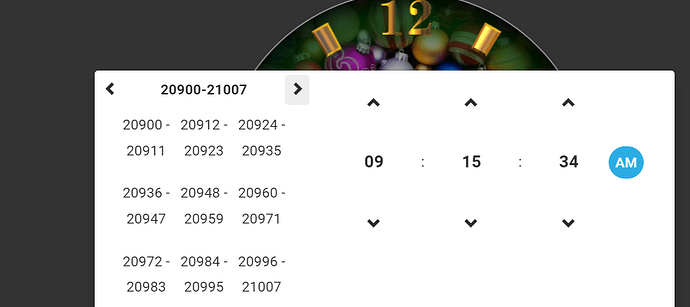Will you be a friend? I had this idea but I can’t even imagine how it could be done? And, not even making the image return to the previous one on January 1, 2024…I think I’m inventing and dreaming about a lot of things…laughs
The tags that I was using were from Facer’s early days. They worked if it was a leap year but automatically did not change back to non-leap year.
Use #DD# in the opacity field. If the value is 1, it is New Year.
This depends on what you had in those designs, or what you plan to do. Plain dates work automatically, no action needed.
Formulas for countdowns (for example to Christmas) need correction to 366 instead 365 days in time from after the date in year before leap year to the date in the leap year. We discussed it here Christmas Countdown
1st January is in the part of year, where leap year does not have influence, if you just want something to appear or disappear on that day. The condition is easy, works same on every year $#DD#==1?100:0$ for opacity (or different numbers for coordinates, if it is animation which needs to be shifted out of screen)
I published this the other day . It is open to Inspection . I have absolutly no Idea where the Countdown Formula came from .Community Gift . It needed Fixing this year for some reason . I have not tested it for all the years that are shown on the Creator Time Machine . I have tested it out till the Unix Timer is Defunct . All the timers will change after that .
I have modified the formula for different Aniversarys . it is not that difficult with the help of #DD# on the time Machine . It is relatively obvious which numbers have to be changed . Remember ther is an extra Leap year every 400 years .
.
.
.
I like challenges, sometimes, but I doubt that what we do here, will be still in use in 2400. ![]()
Well, I see it in a way that maybe we’re creating a legacy here.
Some kids in 2400 may dig out the Facer archives in a museum, play with a smartwatch, and think: “Wow, these guys were on it!” ![]()
Sadly they are going to have to build themselves a converter from the 32 bit UNIX Timer to the new one what ever they decide to call the 64 bit one ( and a chat with Marvin on the server in L.A. ) However the Elgin Pocket watch sitting next to it in the Cabinet will just need a Couple of Twiddels of the Winder .
.
.
.
Thank you all very much… I would really like the image to change just for New Year’s Eve and then return to the normal image, I’ll see if I can and then I’ll put it here so you can take a look.
I loved the screen that my friend Russel put up with the phrase passing by, I’ll see if I can put it up for the day first.
Muito obrigado a todos…eu realmente gostaria que a imagem mudasse apenas na passagem de ano e, depois voltasse a imagem normalvou ver se consigo e depois coloco aqui para que possam dar uma olhada.
Adorei a tela que o amigo Russel colocou com a frase passando vou ver se consigo colocar a mesma para o dia primeiro.
Check here, it explains it quite well:
This is a countdown days to christmas day (25th december for those not sure) for leap years and non leap years:
$#DISLEAPYEAR#=false?(359-#DD#):(360-#DD#)$
Using the day in year tag and leap year tag are the key.
Does that give you days till the next on the 26th ?
Between 26th and 31st dec it will display negative days that have past 25th from -1 to -6. Then on 1st Jan it will again calculate number of days to 25th dec.
But if that is not desired, just hide the field if result < 0 etc.
Can’t have it all!
The Candy Cane formula stars counting on the 26th . This will work for any anniversary you care to find the day number of . Have a look it is a fabulous bit of maths .Well it is to me . Not my work . It was left somewhere on the Community as a gift . I had to tweak it as the Syntax Mods broke it but I have no memory of what I had to do . That is the problem with my Brain . Soon as the job is done I forget straight away . Just copy and Paste .
If with everything you do, explain and guide your brain there is a problem now I’m worried about mine…laughs
Se com tudo que você faz, explica e orienta seu cérebro tem algum problema agora estou preocupado com o meu…risos
My Friend if you are here you have a problem . Other People have a Life . Fortunately you don’t really need to be a Genius to have Fun . Just Enjoy .
.
.
.
Meu amigo, se você está aqui, você tem um problema. Outras pessoas têm uma vida. Felizmente você realmente não precisa ser um Gênio para se divertir. Apenas aproveite .
.
.
.

If you inspect you can play with the calendar date in time machine to see if logic works.
Looks like you can probably do it all in one field…but i like to split it into separate text fields as its easier for me to understand !
Above give weird results for me.
I believe that is the old version that used to work until Facer updated mid last year. I took out all the leap year parts and just used $(#Dy#/4)==floor(#Dy#/4)&&#DD#<=360?360-#DD#:$ $(#Dy#/4)!=floor(#Dy#/4)&&#DD#<=359?359-#DD#:$ with opacity so it would only start showing during December. $#DMM#==12&&#DdL#<25?100:0$
Then I used this as a countdown until New Years $#Dy#%4==0&&#DD#<=367?367-#DD#:$ $#Dy#%4!=0&&#DD#<=367?366-#DD#:$ Days Until (#Dyyyy#+1) and I used $#DMM#==12&&#DdL#>25?100:0$ in opacity.
I had to cheat the system by making it less functional, but more stable.
Yep, I think its hard to do it all in one field… and alot easier to make sense of formulas if they are split into separate objects.
